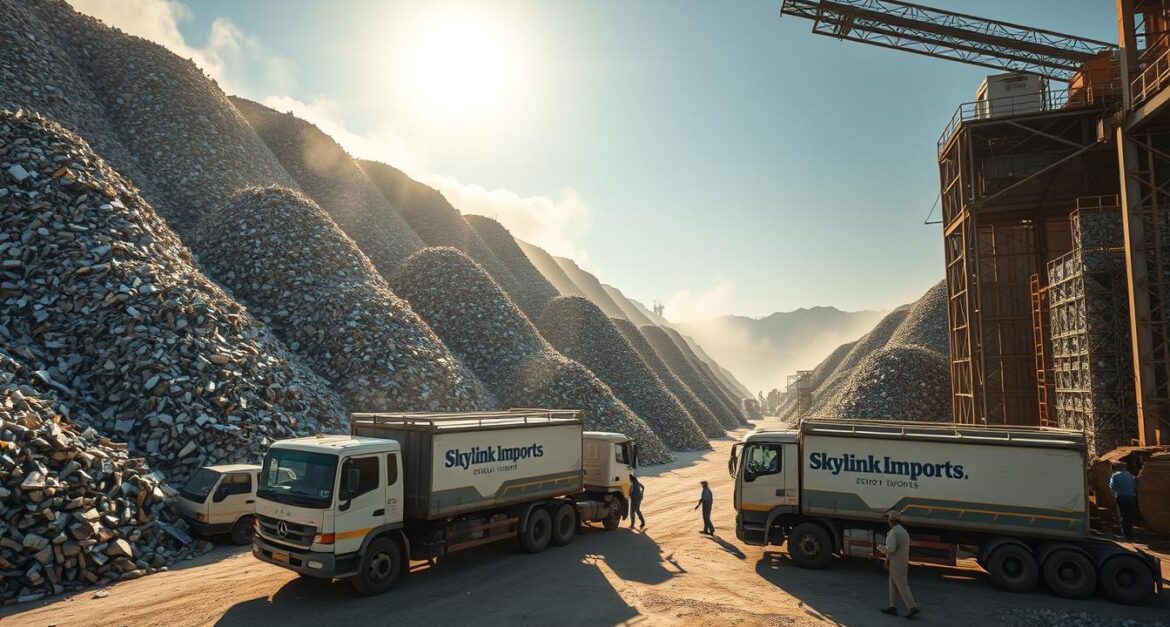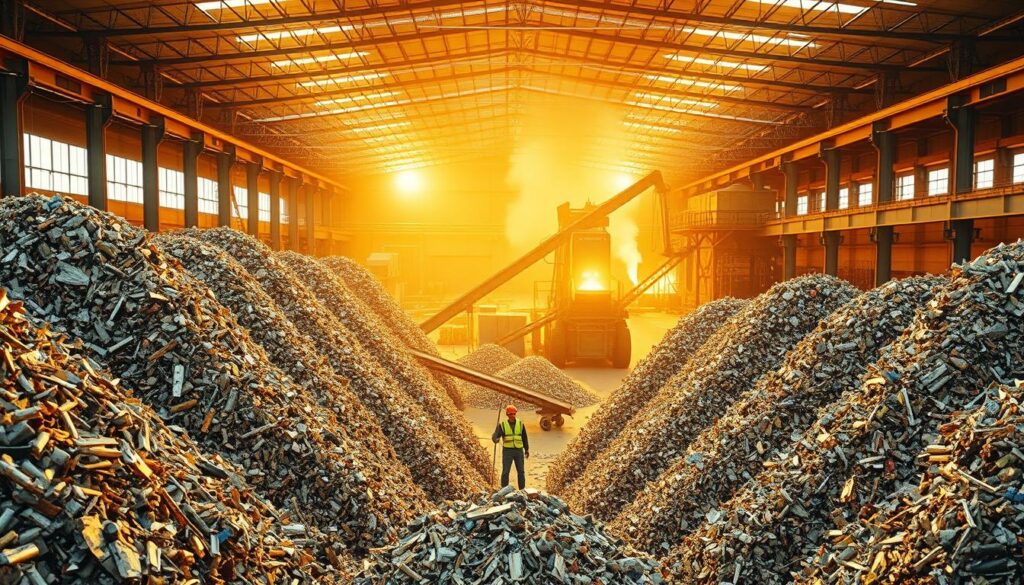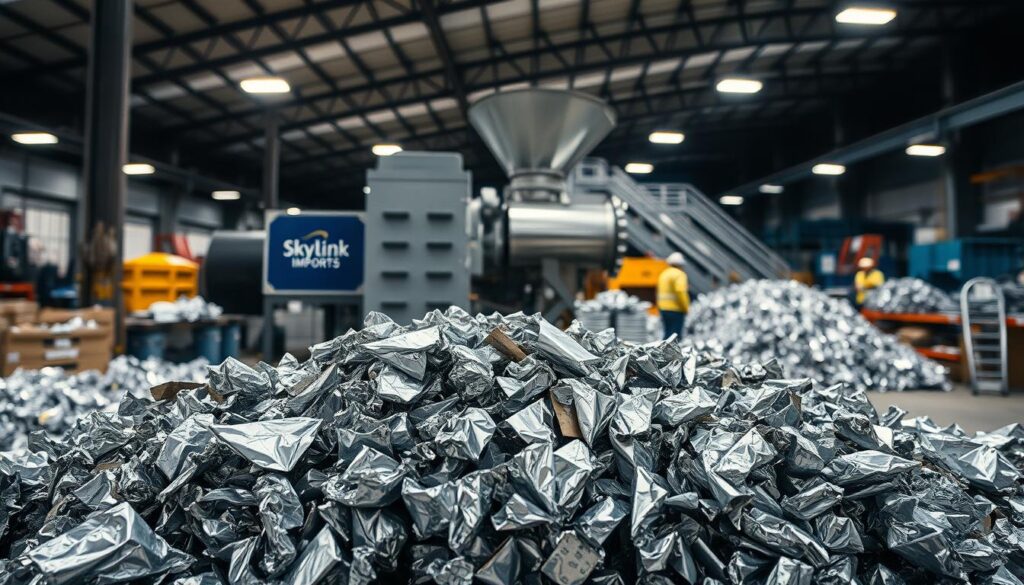
The global recycling market is witnessing a significant shift, with aluminium scrap emerging as a highly valued commodity. Skylink Imports, a global import-export solutions provider, has observed a substantial increase in demand for aluminium scrap, driven by its potential for sustainable recycling.
The rising value of aluminium scrap is attributed to its widespread use in various industries, including transportation, construction, and packaging. As the world moves towards more sustainable practices, the importance of aluminium recycling is becoming increasingly evident.
Key Takeaways
- Aluminium scrap is gaining value in the global recycling market.
- Sustainable aluminium recycling is driving demand for aluminium scrap.
- The use of aluminium scrap is widespread across various industries.
- Recycling aluminium scrap is crucial for sustainable practices.
- Skylink Imports is a key player in the global import-export market.
The Rising Value of Aluminium Scrap in Global Markets
The global aluminium scrap market is witnessing a significant surge in value. This upward trend is driven by the increasing demand for recycled aluminium in various industries, including automotive, construction, and packaging.

Current Market Trends and Valuations
Current market trends indicate a steady increase in the valuation of aluminium scrap. The trends in the aluminium scrap market show a shift towards more sustainable practices, with manufacturers opting for recycled aluminium to reduce their environmental footprint.
The market valuation of aluminium scrap is influenced by factors such as global demand, primary aluminium prices, and the availability of scrap. As the demand for recycled aluminium continues to grow, the value of aluminium scrap is expected to rise.
Factors Driving the Increasing Value
Several factors are driving the increasing value of aluminium scrap. The increasing demand for recycled aluminium is a major driver, as industries seek to reduce their carbon footprint and comply with environmental regulations.
Additionally, the limited supply of primary aluminium and the energy savings associated with recycling aluminium contribute to the rising value of aluminium scrap. Companies like Skylink Imports, which offer global import-export solutions, play a crucial role in facilitating the trade of aluminium scrap, further driving its value.
Why Aluminium Scrap Is the New Gold in Recycling Markets
Aluminium scrap is increasingly being regarded as a valuable commodity, akin to gold, in the recycling markets. This shift is largely due to its inherent economic stability and value retention capabilities.
Economic Stability and Value Retention
Aluminium scrap offers a stable investment avenue due to its high recyclability without any loss in quality. This characteristic ensures that aluminium retains its value over multiple recycling cycles, making it an attractive option for investors. The aluminium scrap industry is witnessing significant growth, driven by the increasing demand from various sectors, including automotive and construction.
The value retention of aluminium scrap is further enhanced by the rising costs of primary aluminium production. As energy costs soar and environmental regulations tighten, recycling aluminium becomes a more economical and environmentally friendly option. For instance, recycling aluminium uses 95% less energy than producing it from raw bauxite, significantly reducing production costs.

Investment Potential in Recycled Aluminium
The profitable aluminium scrap industry is not just a trend but a growing market with substantial investment potential. Companies like Skylink Imports are at the forefront, facilitating the global trade of aluminium scrap and connecting buyers with suppliers worldwide. For those interested in exploring this lucrative market, Skylink Imports can be contacted atinfo@skylinkimports.com or +1 (403)266-9394, +91-9041-543543.
Investing in aluminium scrap offers numerous benefits of recycling aluminium scrap, including reduced environmental impact and cost savings. As the world moves towards a more circular economy, the demand for recycled aluminium is expected to rise, making it a potentially lucrative investment opportunity.
In conclusion, aluminium scrap is indeed becoming the new gold in recycling markets, driven by its economic stability, value retention, and significant investment potential. As the industry continues to evolve, stakeholders can capitalise on this trend by understanding the benefits and opportunities presented by aluminium scrap recycling.
The Environmental Impact of Aluminium Recycling
The environmental impact of aluminium recycling is multifaceted, offering numerous ecological advantages. Aluminium recycling is a critical component of sustainable practices globally, and its benefits extend to energy savings, reduced carbon footprint, and conservation of bauxite resources.
Energy Savings Compared to Primary Production
Recycling aluminium uses significantly less energy compared to producing primary aluminium. It’s estimated that recycling aluminium saves up to 95% of the energy required for primary production. This substantial energy saving is crucial in reducing the overall carbon footprint associated with aluminium production.
Reduction in Carbon Footprint
The aluminium recycling process results in a considerable reduction in greenhouse gas emissions. By recycling aluminium, we can decrease the demand for primary aluminium production, which is a significant source of CO2 emissions. This reduction is vital in combating climate change.
Conservation of Bauxite Resources
Aluminium recycling also plays a crucial role in conserving bauxite resources. By reusing aluminium scrap, we reduce the need for bauxite mining, thus preserving natural habitats and reducing environmental degradation associated with mining activities.
Companies like Skylink Imports, with operational roots in India and headquartered in Calgary, are at the forefront of promoting sustainable aluminium recycling practices. Their efforts contribute to a more environmentally friendly aluminium industry, aligning with global initiatives to reduce ecological footprints.
In conclusion, the environmental benefits of aluminium recycling are substantial, ranging from energy savings and reduced carbon emissions to the conservation of natural resources. As the world continues to embrace sustainable practices, the role of aluminium recycling will become increasingly important.
The Circular Economy of Aluminium
The circular economy concept is particularly relevant to aluminium, given its ability to be recycled without losing quality. This characteristic makes aluminium an ideal material for sustainable manufacturing practices.
Infinite Recyclability Without Quality Loss
Aluminium’s infinite recyclability is a significant advantage in the circular economy. Unlike many other materials, aluminium can be recycled repeatedly without any degradation in its properties. This means that aluminium scrap can be continually cycled back into production, reducing the need for primary aluminium extraction and processing.
Key benefits of aluminium’s recyclability include:
- Conservation of natural resources
- Energy savings compared to primary production
- Reduction in carbon footprint
Closed-Loop Systems in Manufacturing
Closed-loop systems, where materials are continually cycled back into production, are becoming increasingly prevalent in aluminium manufacturing. This approach not only reduces waste but also minimizes the environmental impact of production processes.
As companies like Skylink Imports specialize in sourcing and logistics for aluminium scrap, they play a crucial role in facilitating the circular economy. By ensuring a steady supply of recyclable materials, they help manufacturers maintain closed-loop systems.
The integration of aluminium scrap recycling into manufacturing processes is a step towards a more sustainable future. By embracing the circular economy, the aluminium industry can reduce its environmental footprint while maintaining economic viability.
The United States Aluminium Scrap Market
The U.S. aluminium scrap market is on the rise, driven by advancements in recycling technologies and growing environmental concerns. As the demand for sustainable materials increases, the importance of aluminium scrap in the U.S. recycling industry continues to grow.
Domestic Collection Infrastructure
The United States has a well-developed infrastructure for collecting aluminium scrap, with numerous facilities across the country dedicated to processing and recycling aluminium materials. This infrastructure is crucial for maintaining a steady supply of aluminium scrap to manufacturers.
Key components of the domestic collection infrastructure include:
- Scrap yards and recycling centres
- Specialised aluminium processing facilities
- Transportation networks
Policy Landscape and Incentives
The policy landscape in the United States plays a significant role in shaping the aluminium scrap market. Various government initiatives and regulations aim to promote recycling and sustainable practices.
Incentives for aluminium recycling include:
- Tax credits for recycling facilities
- Grants for research and development in recycling technologies
- Regulations encouraging the use of recycled materials in manufacturing
| State | Number of Recycling Facilities | Annual Aluminium Scrap Processed (tons) |
|---|---|---|
| California | 15 | 100,000 |
| Texas | 10 | 80,000 |
| New York | 8 | 60,000 |
Major U.S. Players in Aluminium Recycling
Several major companies are leading the way in aluminium recycling in the United States. These companies are involved in various aspects of the recycling process, from collection to processing.
Skylink Imports, for instance, offers import-export solutions that can facilitate the global trade of aluminium scrap, connecting U.S. recyclers with international markets.
The Processing Journey: From Scrap to Valuable Resource
The journey of aluminium scrap from waste to a valuable commodity is made possible through advanced sorting and refining techniques. This transformation is crucial in the recycling industry, as it not only conserves natural resources but also reduces environmental impact.
Advanced Sorting Technologies
Advanced sorting technologies play a pivotal role in aluminium scrap recycling. Techniques such as eddy current separation and sensor-based sorting enable the efficient separation of aluminium from other materials. These technologies ensure that the aluminium scrap is processed to a high standard, ready for reuse in manufacturing.
Refining and Purification Techniques
After sorting, refining and purification techniques are applied to enhance the quality of the aluminium scrap. Melting and alloying processes are used to achieve the desired chemical composition and material properties. This step is critical in producing high-quality aluminium that meets the specifications required by manufacturers.
Quality Control Standards
Implementing stringent quality control standards is essential in aluminium scrap recycling. Facilities like those operated by Skylink Imports adhere to rigorous testing protocols to ensure the aluminium produced is of high purity and quality. This not only satisfies customer requirements but also supports the production of sustainable materials.
| Technology | Description | Benefit |
|---|---|---|
| Eddy Current Separation | Uses magnetic fields to separate aluminium | Efficient separation |
| Sensor-Based Sorting | Utilizes sensors to identify and sort materials | High accuracy |
| Melting and Alloying | Processes to achieve desired chemical composition | High-quality output |
By bridging the gap between manufacturers and markets, companies like Skylink Imports facilitate the aluminium scrap recycling process, ensuring that valuable resources are recovered and reused efficiently.
Economic Benefits Beyond Raw Material Value
Aluminium recycling offers numerous economic advantages that are not immediately apparent. Beyond the value of the recycled material, the industry contributes to the economy in various significant ways.
Job Creation in Recycling Industries
The aluminium recycling industry is a significant source of employment. From collection and sorting to processing and manufacturing, numerous jobs are created, contributing to local economies. As the demand for recycled aluminium grows, so does the potential for job creation in this sector.
“Recycling aluminium creates more jobs than producing primary aluminium”, highlighting the industry’s potential for employment growth.
Cost Savings for Manufacturers
Using recycled aluminium can lead to substantial cost savings for manufacturers. The energy required to recycle aluminium is significantly less than producing primary aluminium, resulting in lower production costs. This cost advantage can make manufacturers more competitive in the global market.
Market Stability Through Domestic Recycling
Domestic recycling of aluminium helps stabilize the market by reducing reliance on imported raw materials. This stability can protect manufacturers from volatile global market prices and supply chain disruptions. As Skylink Imports provides reliable and efficient import-export solutions, companies can further enhance their market stability by leveraging such services.
By fostering a robust domestic recycling industry, economies can benefit from increased market stability, job creation, and cost savings for manufacturers. The overall economic benefits of aluminium recycling underscore its importance in the modern economy.
The Role of Import-Export in Aluminium Scrap Markets
The import-export of aluminium scrap is a vital component of the global recycling market. As the demand for recycled aluminium continues to grow, the role of international trade in aluminium scrap becomes increasingly significant.
International Trade Dynamics
International trade dynamics play a crucial role in the aluminium scrap market. Countries with advanced recycling technologies often import aluminium scrap from nations with less developed recycling infrastructures. This exchange not only helps in meeting the demand for recycled aluminium but also aids in maintaining global market stability.
Key Players in International Trade:
| Country | Import/Export Role | Specialization |
|---|---|---|
| United States | Major Importer | Advanced Recycling Technologies |
| China | Major Exporter | Large-Scale Scrap Collection |
| Germany | Major Importer & Exporter | High-Quality Scrap Processing |
How Skylink Imports Facilitates Global Aluminium Recycling
Skylink Imports, as a global import-export solutions provider, plays a pivotal role in facilitating the trade of aluminium scrap across borders. By connecting suppliers with buyers worldwide, Skylink Imports ensures a smooth flow of aluminium scrap into the global recycling stream.
Skylink Imports’ expertise in navigating complex international trade regulations and logistics enables the efficient movement of aluminium scrap, supporting the growth of the global recycling industry.
Navigating Regulatory Challenges
Navigating the regulatory landscape is one of the significant challenges in the import-export of aluminium scrap. Different countries have varying regulations regarding the import and export of recyclable materials, including aluminium scrap.
Regulatory Challenges:
- Compliance with International Trade Laws
- Adherence to Environmental Regulations
- Classification and Certification of Aluminium Scrap
Skylink Imports works closely with stakeholders to ensure compliance with these regulations, thereby facilitating the uninterrupted flow of aluminium scrap across global markets.
Future Trends in Aluminium Scrap Recycling
Future trends in aluminium scrap recycling are expected to be shaped by significant technological innovations and an increasing demand for sustainable materials. As the industry evolves, several key factors will influence its trajectory.
Technological Innovations
Advancements in sorting and processing technologies are revolutionizing the aluminium recycling industry. Advanced sorting technologies, such as AI-powered sorters, are improving the efficiency and purity of aluminium scrap processing.
Innovations in refining and purification techniques are also enhancing the quality of recycled aluminium, making it more competitive with primary aluminium.
Growing Demand from Sustainable Manufacturing
The growing demand for sustainable materials in manufacturing is driving the aluminium recycling industry forward. Sustainable manufacturing practices are becoming increasingly important as companies seek to reduce their environmental footprint.
Aluminium scrap recycling plays a crucial role in this context, providing a closed-loop system that conserves resources and reduces waste.
Predictions for Price and Demand
As demand for recycled aluminium continues to grow, predictions suggest that prices will stabilize and potentially increase due to supply chain constraints and growing demand from sustainable manufacturing sectors.
| Trend | Impact | Timeline |
|---|---|---|
| Technological Innovations | Increased Efficiency and Purity | Short-Term |
| Growing Demand from Sustainable Manufacturing | Higher Demand for Recycled Aluminium | Medium-Term |
| Price and Demand Predictions | Stabilization and Potential Increase in Prices | Long-Term |
For more information on aluminium scrap recycling and how to navigate these future trends, contact Skylink Imports. Stay ahead in the aluminium recycling market by leveraging the latest technological innovations and sustainable practices.
Conclusion: The Golden Future of Aluminium Recycling
The aluminium scrap recycling industry is poised for a sustainable future, driven by increasing demand from manufacturers and advancements in recycling technologies. As highlighted throughout this article, aluminium scrap has become a valuable resource in global markets, offering economic and environmental benefits.
Skylink Imports plays a crucial role in bridging the gap between manufacturers and markets, facilitating the import-export of aluminium scrap and promoting a closed-loop recycling system. By doing so, Skylink Imports contributes to a more sustainable future for the industry, enabling the efficient reuse of aluminium resources.
As the industry continues to evolve, the importance of aluminium scrap recycling will only grow. With companies like Skylink Imports at the forefront, the future of aluminium recycling looks bright, promising a more environmentally friendly and economically stable market for all stakeholders involved.
Email us: info@skylinkimports.com
Contact us: +1 (403) 266-9394, +91-9041-543543





